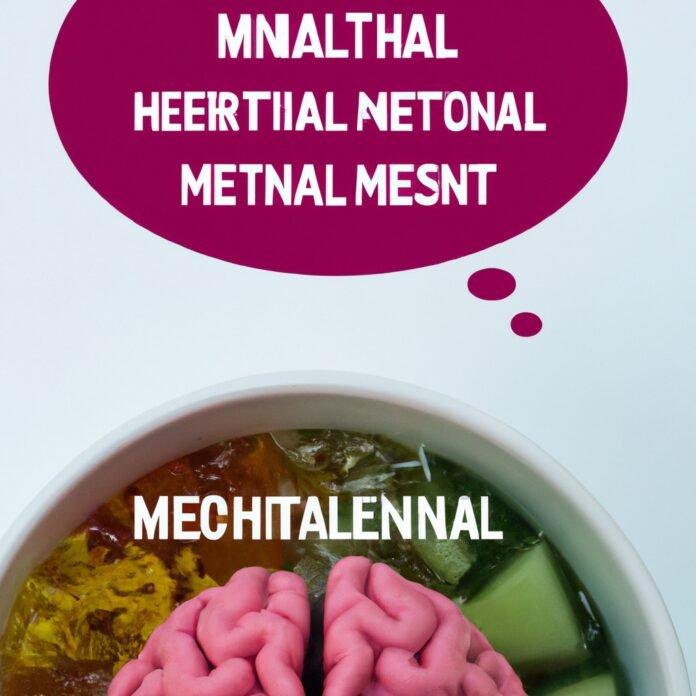In recent years, studies have revealed the importance of diet in terms of the health of both the body and the mind. We’ve all heard that “you are what you eat”, but is that really so? According to new research, the answer appears to be a resounding yes – and it’s all thanks to the gut-brain connection. In this article, we’ll be taking a closer look at how mental health and nutrition are linked through the gut-brain connection and what this means for our overall well-being. So fasten your seatbelts, as we explore the surprising ways that what we eat affects our mental health.
1. Understanding the Gut-Brain Connection
Ever wondered why exercising, eating well and getting enough sleep can all contribute to a good mood? The truth lies in the gut-brain connection. It’s a fascinating relationship where what we eat, how we feed our gut bacteria, and our general state of health all have a direct impact on the way our brain functions. Here are some of the ways that our gut connects to our mental health:
The gut-brain connection is a two-way street. Not only does an unhealthy gut affect mental health, but an unhealthy mind can also have a negative impact on digestive health. This is due to the neural networks found within the gut tissue, known as the enteric nervous system (ENS). It’s connected to the brain and can be influenced by our psychological state.
Processed foods, unhealthy diets, high levels of stress and even too much caffeine can all have a negative effect on the gut microbiome. This can lead to an overactive immune system and the release of inflammation-causing molecules like cytokines, which can have consequences beyond just the gut.
- Cytokines can travel through the bloodstream and cross the blood-brain barrier, leading to depression and anxiety.
- Chronic stress can also alter the balance of gut bacteria, causing problems with digestion, energy levels and cognitive function.
- The gut microbiome also plays a key role in the production of neurotransmitters like serotonin, dopamine and GABA – all of which are responsible for our emotions and feelings of happiness.
By taking steps to improve gut health – such as reducing sugar, processed food and caffeine, as well as increasing your intake of fiber-rich whole foods – you can give your brain the support it needs to better manage stress and anxiety. This may involve eliminating certain foods while also adding nutrient-rich foods, such as probiotics, to encourage a healthy balance of bacteria in the gut.
While this may seem daunting, the results are worth it. Keeping your gut healthy can have a powerful impact on your overall mental well-being.

2. The Role of Nutrition and Mental Health
A balanced diet is an important factor when it comes to protecting your mental health. Not only does good nutrition play a part in healthy brain development, but it can also reduce the risk of anxiety and depression.
Essential Minerals and Vitamins
- Omega-3 fatty acids – Found in fish, oil and plant sources, these essential fats are important for maintaining a healthy brain and reducing symptoms of depression.
- Vitamins B, C and D – Essential for supporting healthy brain and nerve function.
- Magnesium – This mineral is required for healthy levels of serotonin, a key neurotransmitter involved in mood.
Adequate intake of vitamins, minerals and other nutrients can help to protect against poor mood.
Dietary Approach
Whole, unprocessed foods are the preferred choice when it comes to providing your body with the vital minerals and vitamins it needs. Switching to a more plant-based diet is also beneficial as vegetables and legumes are great sources of fibre, micronutrients and essential fatty acids.
Eating foods that contain probiotics, such as yoghurt, kefir and sauerkraut, is also beneficial as these bacterial species can help to reduce inflammation in the gut and maintain balance in the body.
Avoid Unhealthy Foods
- Added sugars – High levels of sugar in the diet can cause inflammation and reduce the body’s ability to absorb essential minerals and vitamins.
- Refined carbohydrates – Foods such as white bread and pasta can cause blood sugar levels to spike, leading to irritability and mood swings.
- Alcohol – Large amounts of alcohol can lead to dehydration, sleep disruption and increases in stress hormones.
Overall, ensuring that your diet is balanced and full of nutritious foods is essential for supporting your mental health. Eating the right foods can help to reduce feelings of anxiety and depression, as well as keep your energy levels steady and your mind in balance.
3. How Nutrients Influence Stress & Anxiety
We have all experienced times where our worries seem to take over every aspect of our lives. While it’s easy to turn to coping methods like drinking a cup of tea or taking a hot shower, good nutrition is often overlooked as a way to alleviate stress and anxiety. In our busy and chaotic lives, it’s essential to understand how nutrients can influence our mental health.
B Vitamins
- B vitamins have a positive influence on stress and anxiety as they are commonly used to treat mental health issues.
- B vitamins, especially B6, play a crucial role in producing the hormones responsible for regulating our moods.
- B vitamins can help improve our moods, energy levels and our bodies’ ability to manage stress.
Omega-3 Fatty Acids
- Omega-3 fatty acids are a powerful nutrient for reducing stress and anxiety.
- Studies have found that people who take omega-3 fatty acids regularly for a few weeks or months show improvement in both stress and anxiety levels.
- Omega-3 fatty acids may help strengthen the brain’s resilience against stress and be able to better regulate our moods.
Magnesium
- Magnesium plays a role in mental health, as it helps to maintain healthy hormones and protects our nerve cells.
- Studies have shown that a magnesium deficiency may lead to an increase in stress and anxiety.
- Boosting magnesium levels through diet and supplements may help alleviate the symptoms of both conditions.
Selenium
- Selenium helps to support the nervous system and can ease feelings of stress and anxiety.
- Selenium is found in many foods, such as Brazil nuts, mushrooms, fish, eggs and some grains.
- Taking a selenium supplement may help to relieve symptoms of stress and anxiety.
By incorporating more nutrient-rich foods into your diet and supplementing with vitamins and minerals, you can help manage and reduce stress and anxiety. Maintaining a healthy, balanced diet can be an important component of a comprehensive strategy for managing mental health.
4. Discovering the Impact: Nutrition as a Mental Health Tool
The importance of nutrition in mental health cannot be overstated. Without the proper nutrition, our bodies are left weak, vulnerable, and fatigued, leaving us open to the development of mental health issues. By maintaining a healthy diet, we can keep our mental health in check, and make sure that we are able to make the most of our lives.
There are some key elements to consider when making decisions about dietary intake. Eating plenty of fruit and vegetables, as well as healthy proteins, is a solid way to ensure that the body is receiving the necessary nutrients to keep our mental health in good condition. It’s also important to make sure that whatever we eat is low in processed sugars and fats, as these can be detrimental to good mental health.
Besides avoiding processed foods, mental health can be greatly enhanced by including:
- Antioxidants: Antioxidants are important for neutralizing free radicals and helping to keep our brains functioning optimally. Foods such as berries, nuts, and even dark chocolate are full of these amazing molecules.
- Omega-3 Fatty Acids: Omega-3 fatty acids have been studied extensively for their positive effects on mental health, as they can help to reduce inflammation and provide essential fatty acids to the brain. Foods such as wild-caught fish, walnuts, and flaxseeds are great sources of essential fatty acids.
- Vitamins & Minerals: Vitamins and minerals play a key role in the proper functioning of our brains. Vitamins such as B-vitamins, vitamin D, and vitamin E can help to keep the brain healthy, while minerals such as selenium, zinc, and magnesium are important for both physical and mental wellbeing.
Making sure that we eat the right foods can have a huge impact on our mental health. By taking the time to understand our nutritional needs, and ensuring that we get the necessary vitamins, minerals, and other nutrients, we can help to keep our minds in top form.
Your diet can have a tremendous impact on your mental health, and understanding the connection between nutrition and the gut-brain axis is an important step in the journey of healthy living and a healthy mind. Learning more about the benefits of healthy eating and the foods that can have a positive effect on both the gut and the brain can help equip you with the tools to take charge of your physical and mental well-being. So fuel your body with the right nutrition, and watch your mental wellbeing soar.

